2026 Elections: Ugandans front 10 most pressing concerns
On the issue of education, voters cited poor school facilities, costly fees charged, poor quality education due to limited teacher capacity and inadequate materials, as well as long distances to schools, among other issues.
The top three national-level concerns across the different sub-regions include health, which is a leading concern across most regions, especially critical in Teso (75%), Toro (67%), Karamoja (64%), Bunyoro (62%), and Bugisu/Bukedi (61%), while Kampala (30%) and West Nile (39%) report relatively lower concern.
By Umar Kashaka
Journalists @New Vision
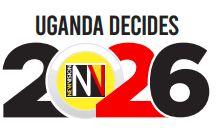
THE CITIZENS' MANIFESTO
In an opinion poll conducted by Vision Group between March and May 2025, ahead of next year’s general election, Ugandans shared their 10 most pressing concerns. Umaru Kashaka presents the survey findings.
At the arthroplasty (joint repair) ward in Mulago National Referral Hospital, Winnie Mukhwana writhes in agony as she lies on her bed, skin sagging over her bones in both legs.
Her concerned mother, Joyce Wamakote, lovingly comforts her as other patients on this 18-bed ward wait in agony for surgeries. Some individuals have faced long wait times for surgeries due to the limited number of orthopaedic surgeons and a shortage of medical equipment.
Wamakote, who hails from Bududa district, says her 21-year-old daughter needs help with all her care and has been receiving treatment for multiple illnesses over the past few years.
Mukhwana has undergone various surgeries, including those on her knees and hip, after being diagnosed with avascular necrosis, one of the complications caused by sickle cell disease.
“I first sold land at sh15m to cover part of the treatment bill, but we have so far spent over sh35m,” Wamakote, a civil servant, says.
She says hip replacement costs close to sh11m, and is bought outside the hospital. Her daughter now waits for another hip replacement surgery. 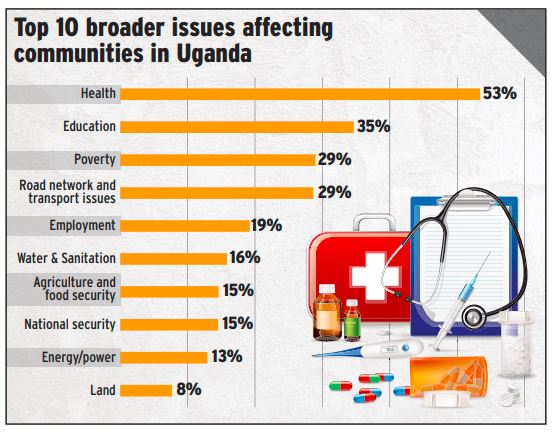
“It is tough because every time we move her out of the hospital, we hire an ambulance or a big car where she can just lie,” Wamakote says.
Mukhwana was first taken to the hospital needing treatment for malaria, but her health later deteriorated.
She had to use a wheelchair. It is now close to one-and-a-half years since she was readmitted to Mulago Hospital. Her mother says she has been medically unfit to leave the hospital since.
“I pray the Government also starts covering the cost of the implants because we are also forced to purchase prescribed drugs from private clinics,” Wamakote says.
Key findings
Mukhwana’s experience in accessing health services and her family’s struggles to raise money for her treatment, especially for implants, tie in with those of other patients interviewed in this arthroplasty ward.
The challenges they are facing were reflected in a new Citizens’ Manifesto and opinion poll conducted by Vision Group between March and May this year.
The survey, which covered 6,006 Ugandans across 58 districts and all 17 sub-regions, showed that health topped the list of the 10 most pressing issues affecting Ugandans in all regions.
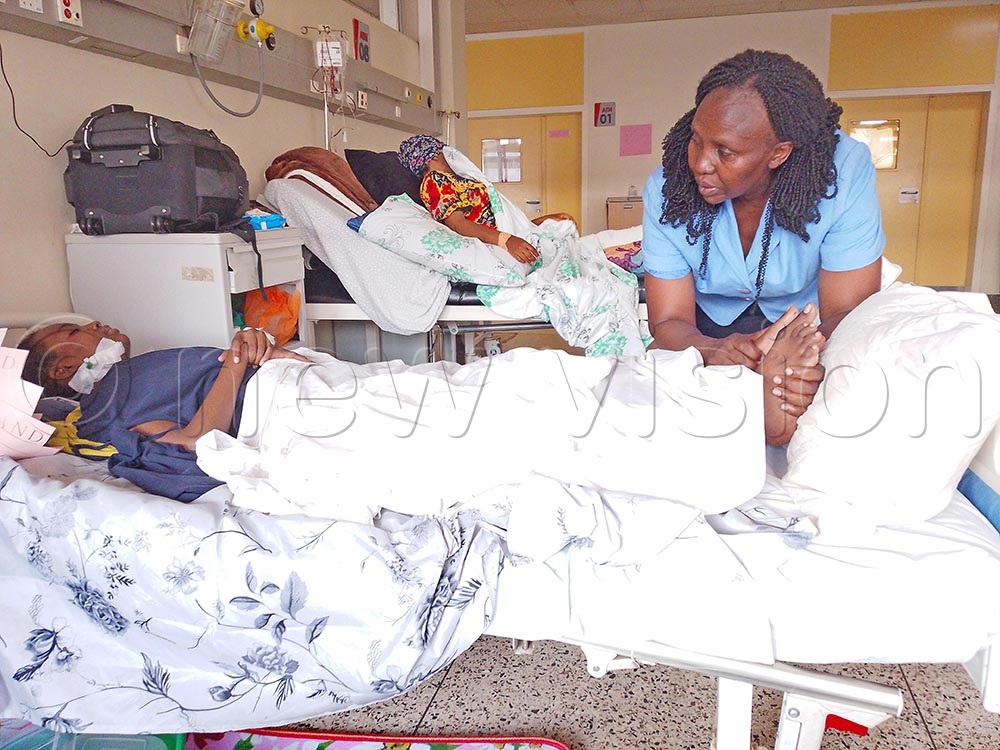
Wamakote comforts Mukhwana, in the joint repair ward at Mulago Hospital in Kampala recently. (Credit: Umar Kashaka)
It was cited by 53% of respondents, followed by education (35%), while poverty and the road network tied in third place at 29%.
Other top issues were employment (19%), water and sanitation (16%), food security (15%), national security (15%), energy access (13%) and land (8%).
Government plan
In the 2021-2026 election manifesto, the National Resistance Movement (NRM) prioritises a well-educated, skilled and healthy population as essential in facilitating socio-economic transformation and personal well-being.
In the current 2025/26 financial year, sh5.87 trillion (7.8%) was allocated to the health sector, a significant increase from sh2.9 trillion in the previous financial year.
However, this increase, which came amid the dismantling of the United States Agency for International Development, is still below the 15% health budget commitment promised under the Abuja Declaration of 2001. Currently, Uganda’s doctor-patient ratio is approximately 1:25,000 which is way above the WHO-recommended doctor-patient ratio of 1:1,000.
The nurse-patient ratio is 1:11,000. The health issues voters raised include the lack of drugs in health centres, inadequate health facilities and services, misallocation of health funds, long distances to health facilities, shortage of healthcare workers and high prices charged in both government and private hospitals, among others.
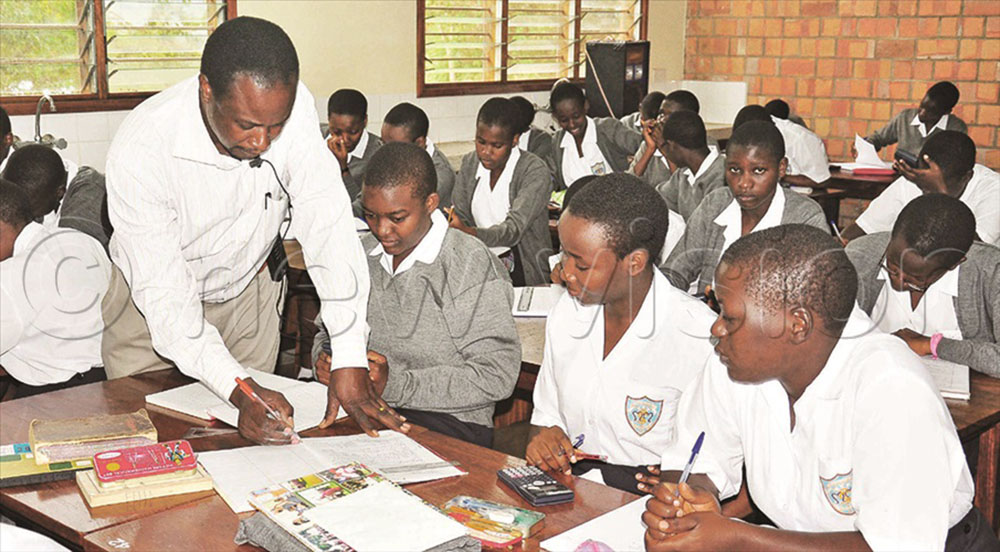
A teacher attending to learners in class. Voters cited high school fees charged and poor-quality education due to limited teacher capacity and inadequate materials, among other issues.
Analysts say inadequate health facilities in Uganda are a significant barrier to accessing quality healthcare, particularly in rural areas. This is due to insufficient funding, poor infrastructure, a lack of equipment and supplies, and shortages of qualified healthcare workers.
The Government’s goal is to ensure that every sub-county, town council and municipal division has a health centre III with a maternity ward and a laboratory.
Over 86% of Ugandans live within 5km of a health facility, according to the NRM manifesto for the current term.
The manifesto says the health infrastructure network currently consists of 6,937 health facilities, of which 3,133 (45.16%) are government-owned, 2,976 (42%) are private for-profit, and the remainder are private not-for-profit.
The finance minister, Matia Kasaija, said the priority interventions of the sh5.87 trillion for this current financial year include functionalising health centres IV, strengthening primary healthcare and community medical services, as well as scaling up of national e-health infrastructure.
Other priority interventions are the promotion of nutrition education and reproductive health, continued deployment of community health extension workers, strengthening the national ambulance and emergency referral system, as well as the construction of specialised health facilities for cancer and cardiovascular care, among other non-communicable diseases.
Prevention is the other key emphasis for the Government.
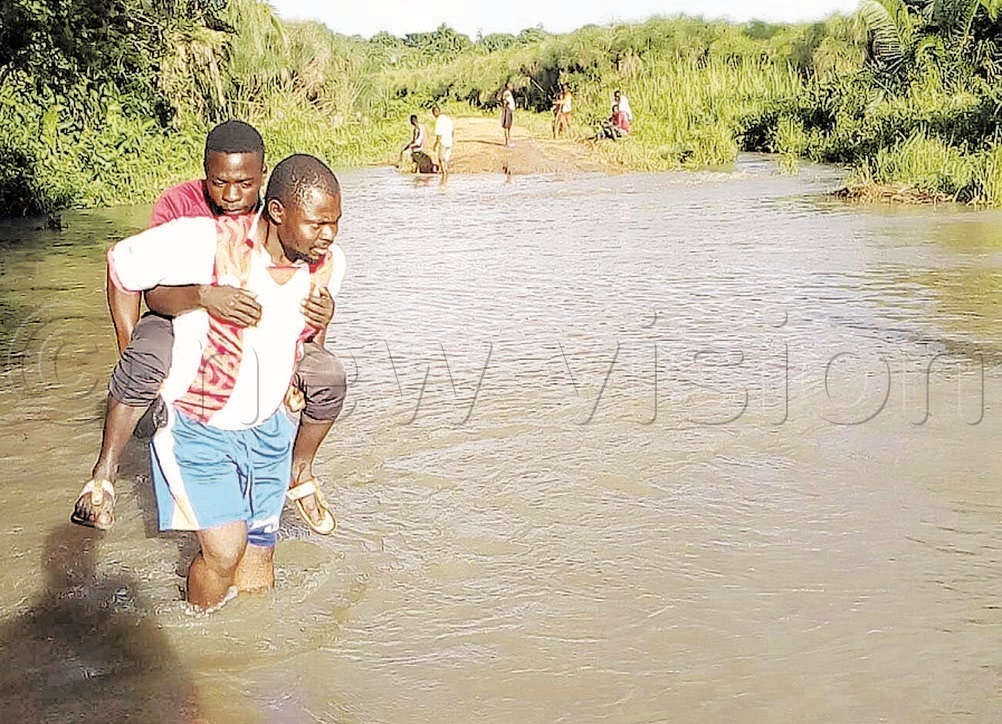
A man carrying a passenger through Kibalagala stream in Nabbaale sub-county, Mukono district. The Government said efforts are underway to improve road infrastructure development.
Education issues
On the issue of education, voters cited poor school facilities, costly fees charged, poor quality education due to limited teacher capacity and inadequate materials, as well as long distances to schools, among other issues.
The key voter demand, according to the survey, is better school facilities and regulated fees. Figures from the Ministry of Education and Sports show that at least 800 government-aided primary schools have four or fewer permanent classrooms as of 2019.
On the fee structure, especially within universal primary and secondary schools, President Yoweri Museveni recently called for a critical assessment of “whether families in communities across the country” are financially capable of paying.
This assessment, Museveni added, will enable the Government to revise its policy on free education.
The Government said universal education has improved the literacy rate. Figures indicate that literacy has risen to 82.8% from 43% among 15-24 year-olds; 81.6% among 18-30 year-olds and 76.0% among adolescents.
“Overall, nine in every 10 youth, regardless of the definition, were literate,” the results of the 2024 National Population and Housing Census show. The sh5.04 trillion that was allocated to the education sector in this financial year is for what the Government says are priority interventions.
These interventions include continued free education for Ugandans under UPE, USE and universal post O’level education and training; providing sponsorships and student loans for higher education and rehabilitation of 120 traditional secondary schools and 31 special needs primary schools.
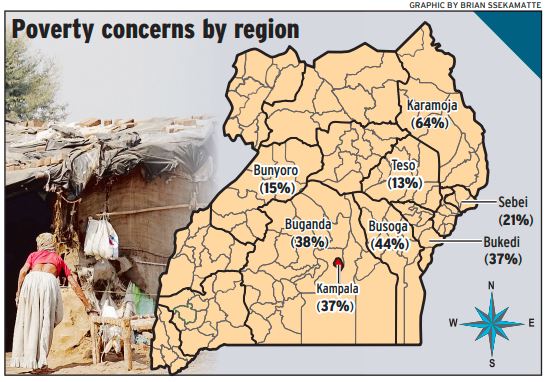
Others are: Construction of 116 new seed schools and expansion of 61 existing secondary schools, recruitment of more teachers and non-teaching staff, strict enforcement of teachers’ and learners’ inspection across the country using an electronic system, as well as providing textbooks and instructional materials to improve the textbook-student ratio to 1:3 from the current 1:15, among others.
Employment
Employment concerns were more pronounced in the central region than in other areas.
Voters cited competition for jobs resulting, in high unemployment rates, corruption among civil servants, low/ delayed wages paid to workers and contract issues, as well as inadequate capital, among others.
The employment-population ratio (EPR) in 2024 was 37.9%, indicating that about four in 10 persons aged 15 and above were employed, according to the 2024 National Population and Housing Census report.
The EPR was higher (43.8%) among males than females (33.1%) aged 15 and above. The EPR was higher (42.6%) among urban populations compared to those in rural areas (34.9%).
Disaggregation of the employed population by educational attainment showed that the majority of those who had attained post-secondary and above were employed (65.8%), while those with no formal education had the lowest at 31.3%, an indication that the probability of being in employment increases with educational attainment.
Experts say public investment must serve as a critical catalyst for job creation by prioritising the expansion of vocational and technical training programmes that collaborate closely with industries to ensure alignment with market demands.

Poverty
Voters also singled out poverty and road network/ transport as the other big issues that they want leaders to address ahead of 2026. They were both reported by 29% of respondents, indicating widespread socio-economic and infrastructure challenges.
Poverty was cited by 38.1% of respondents in central, 30.8% in eastern, 28.1% in northern and 21.8% in western.
High levels of poverty among people, inadequate capital and weak cash flow, as well as inability to get adequate and affordable healthy food, featured prominently.
The national poverty rate has fallen significantly over the past three decades, from 56% in 1992/1993 to 16.1% in 2023/24, mostly due to improved agricultural incomes and improved regional markets after the end of the conflicts in the north.
The 2023/24 Uganda National Household Survey report indicated that the population living below the absolute poverty line in rural areas decreased from 23.4% to 19.4%, while in urban areas from 11.7% to 10.3%.
Over the last 10 years, the Government has invested over sh9 trillion in key wealth creation initiatives to fight poverty.

Government critics point to corruption as the main obstacle to the success of these poverty alleviation programmes.
These include Uganda Development Bank (sh1.45 trillion), the Parish Development Model (sh3.3 trillion by end of 2024/25 financial year), Emyooga (sh553b), the Youth Livelihood Programme (sh207.95b) and the Small Business Recovery Fund (sh100b).
In the Agricultural Credit Facility, the Government injected sh495b, the Youth Venture Capital Fund (sh12.5b), Uganda Women Entrepreneurship Programme (sh168b), the INVITE Project (sh800b), the GROW project (sh824b), and the Uganda Development Corporation (sh1.2 trillion), among others.
Government critics point to corruption as the main obstacle to the success of these poverty alleviation programmes.
Others are poor planning and monitoring, bureaucratic red tape and financial illiteracy among intended beneficiaries.
The latest report by the Inspectorate of Government shows that Uganda loses about sh9.7 trillion annually to corruption, mainly through non-declaration and under-declaration of taxes, employees getting paid even when they do not work, inflated payrolls and botched procurement processes, among others.
The regions where the majority of respondents cited poverty, like central and northern, have been plagued by land conflicts for decades.
For example, citizens said the central region is an area where land conflicts are most prevalent, mainly caused by the predominance of the mailo land tenure system.

For example, citizens said the central region is an area where land conflicts are most prevalent, mainly caused by the predominance of the mailo land tenure system.
To avert this, the Government, through the lands ministry, has been giving out free land titles to poor residents in Buganda in a bid to reduce long-standing land disputes and enable them to concentrate on production.
For the northern region, since 2011, the NRM Government has been executing war recovery programmes through the Northern Uganda Social Action Fund and the Peace, Recovery and Development Plan.
“It shows you that government spending has been well targeted and people are taking advantage of the opportunities that it has created, such as good roads and electricity. People have been able to turn those into household enterprises, and the numbers show that those are driving poverty down,” Joseph Enyimu, a development economist at the finance ministry, said.
Finance minister Matia Kasaija said the Government’s deliberate onslaught on the subsistence economy has resulted in slashing the number of Ugandans working for the stomach to just three in every 10 households.
“With our renewed commitment to fast-track full monetisation of the economy and redirect resources towards agro-industrialisation, tourism, mineral beneficiation, manufacturing, innovations by scientists and digital transformation, Uganda is indeed unstoppable,” Kasaija said in June while reading the national budget for the financial year 2025/26.
Roads
The Vision Group survey also indicated that road network and transport issues are prominent in central (34.3%) and northern (30.3%).
Voters cited bad roads, congestion, narrow roads and limited access to market centres, which they say have resulted in high transportation costs and post-harvest losses, leading to poverty, especially in rural areas.
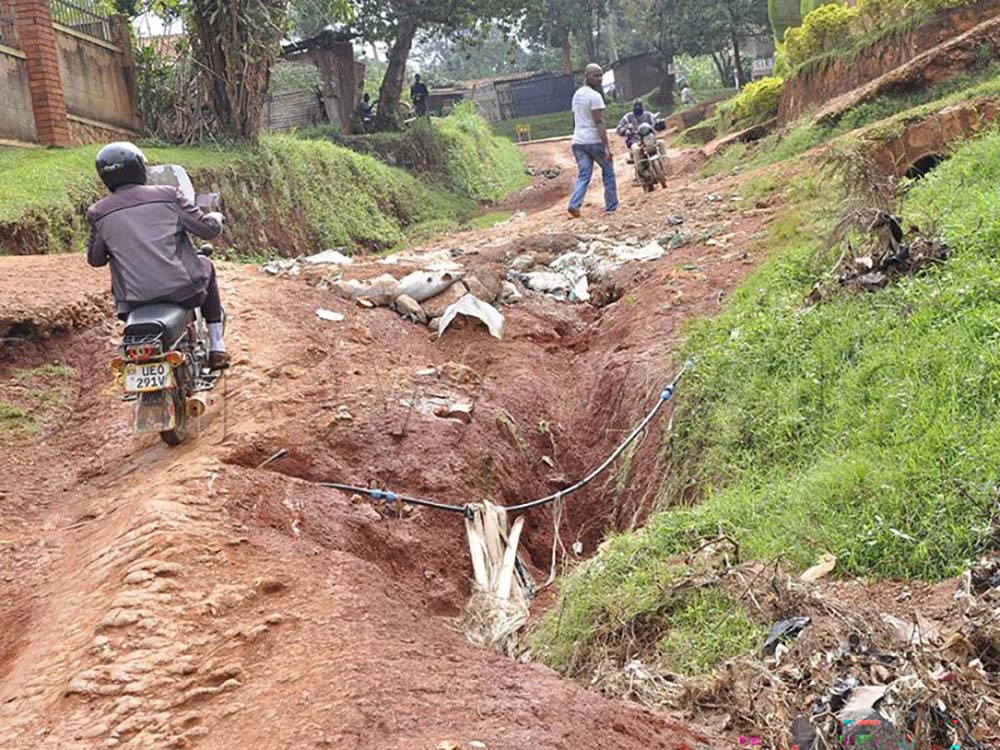
Voters cited bad roads, congestion, narrow roads and limited access to market centres, which they say have resulted in high transportation costs and post-harvest losses, leading to poverty, especially in rural areas.
However, Kasaija said efforts are underway to improve the road infrastructure development, especially rural roads to enable farmers transport their produce to markets.
The finance minister added that every district now directly receives sh1b for road maintenance.
Kasaija also said Uganda is now connected by tarmac roads at all its major international border points, from the South Sudan border in Acholi and West Nile to the southern border of Tanzania, Rwanda and the DR Congo border, and from the Kenya border to the DR Congo border.
“With this improved road network, the travel time, for example, from Malaba to Kisoro by road was reduced from 48 hours to about 10 hours.
This will further improve with the completion of the Kampala-Jinja and Busega-Mpigi express highways,” the minister said. In this financial year, the Government allocated an additional sh790b, bringing the total budget for roads to sh4.28 trillion.
National Security
The survey indicates that 44% of voters cited theft in their respective areas as a major concern, 21.7% mentioned insecurity in the community, while 8.3% said they are troubled by robbery.
Broken down regionally, theft consistently dominated. In the central region, theft stood at 50.7%, insecurity at 19.6% and robbery at 6.7%.
In the eastern region, the existence of theft, insecurity in the community and robbery stood at 45%, 20.9%, and 8.3% respectively.
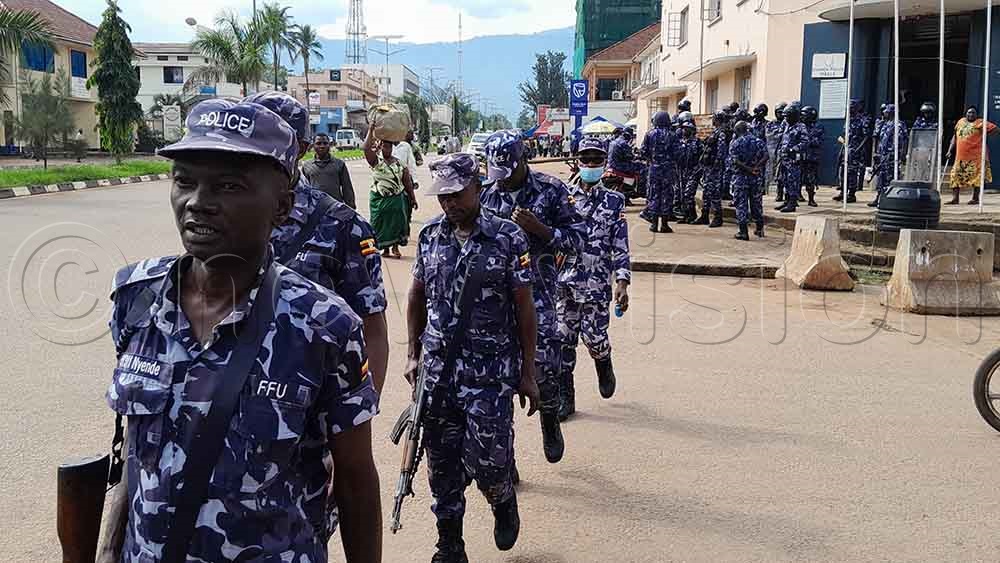
Security personnel on patrol. The survey indicates that 44% of voters cited theft in their respective areas as a major concern, 21.7% mentioned insecurity in the community, while 8.3% said they are troubled by robbery.
For the northern region, theft stood at 41%, insecurity at 28%, and robbery at 7.5%.
In the western region, 40.3% want leaders to address theft, 20.8% cited insecurity and 10% said robbery is an urgent security problem.
In urban areas, such as Kampala, Wakiso and Mukono, residents cited gang violence, drug abuse and street theft as routine threats.
Agriculture, food security
Agriculture and food security stand out in the north (22.3%) while national security concerns are higher in central and western regions compared to the northern region.
Agricultural issues raised include climate change, low yields and livestock losses, fluctuating prices of commodities and produce and a lack of modern farming techniques.
Uganda’s backbone is agriculture, which employs the majority of the population.
It is no surprise then that the Government has, once again, placed agriculture at the heart of its economic agenda under the budget theme, full monetisation of Uganda’s economy through commercial agriculture, industrialisation, expanding and broadening services, digital transformation and market access.
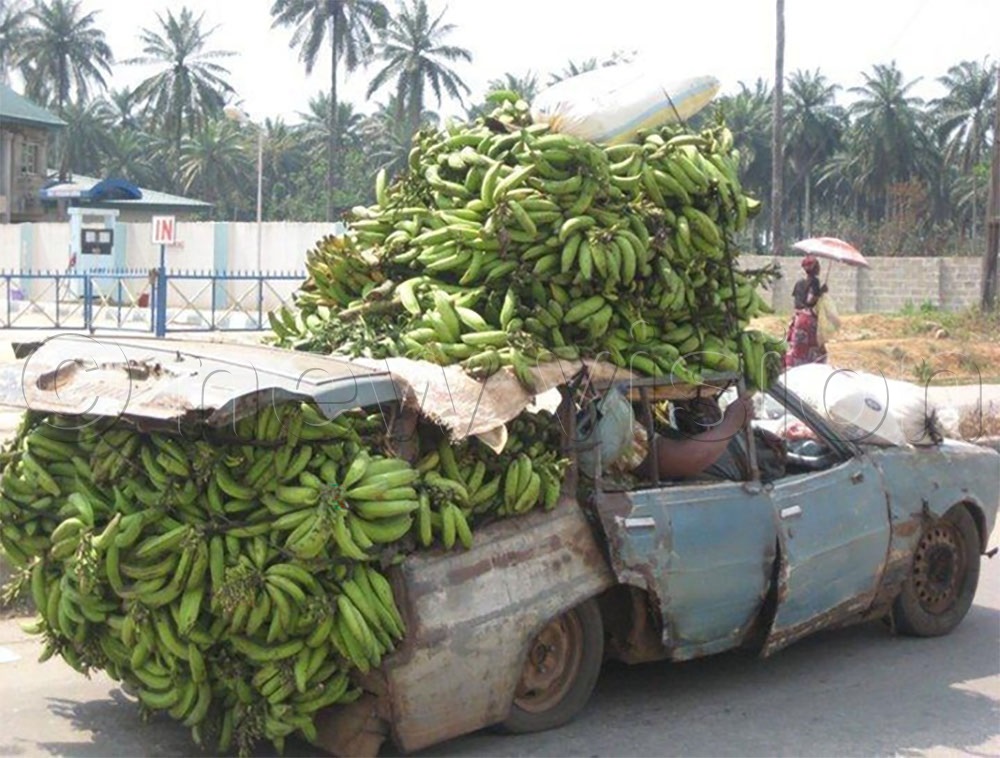
Matooke being transported to market.
The Uganda Development Bank provided sh2.45 trillion to 607 businesses engaged in commercial agriculture, agricultural value addition, manufacturing, tourism and hospitality, education, health services, creatives and the construction industry, as at end of December 2024.
In this financial year, the Government allocated sh1.86 trillion towards deepening agro-industrialisation, increasing commercialisation and competitiveness of agro processing.
Employment
Employment concerns were more pronounced in the central region than in other areas.
Voters cited competition for jobs resulting in high unemployment rates, corruption among civil servants, low/delayed wages paid to workers and contract issues, as well as inadequate capital, among others.
The employment-population ratio (EPR) in 2024 was 37.9%, indicating that about four in 10 persons aged 15 and above were employed, according to the 2024 National Population and Housing Census report.
The EPR was higher (43.8%) among males than females (33.1%) aged 15 and above.
The EPR was higher (42.6%) among urban populations compared to those in rural areas (34.9%).
Disaggregation of the employed population by educational attainment showed that the majority of those who had attained post-secondary and above were employed (65.8%), while those with no formal education had the lowest at 31.3%, an indication that the probability of being in employment increases with educational attainment.
Experts say public investment must serve as a critical catalyst for job creation by prioritising the expansion of vocational and technical training programmes that collaborate closely with industries to ensure alignment with market demands.
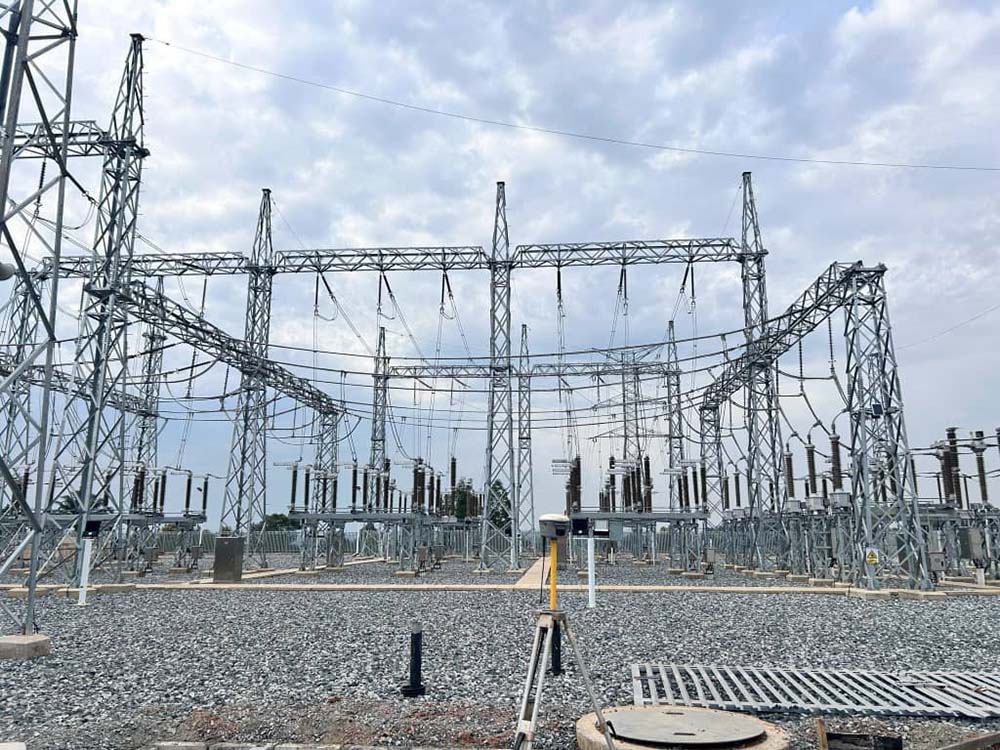
Power supply issues raised include inadequate supply and frequent outages, fluctuating prices, and corruption among civil servants.
Energy
Energy access and land issues are of relatively lower concern across all regions but are still present, with land concerns being highest in the northern region (9.6%).
Power supply issues raised include inadequate supply and frequent outages, fluctuating prices, and corruption among civil servants.
This is despite the increase in the country’s power generation capacity by 600MW from 1,378.7MW to 1,978.1MW following the connection of Karuma hydropower dam to the national grid.
The electricity transmission capacity has now increased to 4,218km of high-voltage power from 3,500km in 2020. In the current financial year, the Government provided sh982.56b to increase access to electricity, improve the quality of power supply through the systematic operation and increase access to clean energy, among others.
Water, sanitation
Water and sanitation are the other major issues voters cited, with 26.4% of citizens in northern Uganda saying these challenges must be addressed urgently.
The Government says water, sanitation and hygiene are essential for life and health, and are a fundamental human right for every child and adult. Safe clean water coverage in rural areas is now estimated at 67%, and 73% in urban areas.

The 2023/2024 National Population and Housing Census report says one of the barriers to the use of safe water is the long distances to the sources.
Out of 71,225 villages, 56,617 villages have been served with at least one safe water source, finance minister Matia Kasaija has said.
“In the rural areas, the target is to reduce the distance to the nearest source of clean and safe water for human and animal consumption to less than 1km, while in urban areas to less than 500 metres,” the minister said while reading the budget in June.
In this current financial year, the Government provided sh516.78b for climate change mitigation, natural resources, environment and water resources management.
The 2023/2024 National Population and Housing Census report says one of the barriers to the use of safe water is the long distances to the sources.
It says 70.0% of households were within less than 1km of an improved water source (basic water services). Analysts say Uganda is exceptionally endowed with water resources, covering 43,938sq. km (18%) of its 241,038sq.km total land area.
However, the Government is yet to exploit this endowment for the well-being of all Ugandans.
General issues
• The top three national-level concerns across the different sub-regions include health, which is a leading concern across most regions, especially critical in Teso (75%), Toro (67%), Karamoja (64%), Bunyoro (62%), and Bugisu/Bukedi (61%), while Kampala (30%) and West Nile (39%) report relatively lower concern.
• Education is a strong concern in Teso (54%), Bunyoro (46%), Busoga (41%) and Bugisu (38%), while less concern was shown in Kampala (14%), Sebei (21%) and West Nile (18%).
• Other thematic highlights were road and transport issues, which were most critical in Kampala (43%), Bugisu (35%), Acholi (33%), and Lango (32%). These were less reported in Bukedi (19%) and Karamoja (22%).
• High unemployment was a concern in Karamoja (35%), Kampala (27%), Buganda/Bugisu (26%), and West Nile (30%), but less concerning in Toro (8%), Rwenzori (8%) and Lango (12%).
• Water and sanitation were the most pressing issues in Acholi (31%), West Nile (29%), and Lango (27%), and concerned very few respondents in Teso (5%), Bugisu (4%) and Bukedi (8%).
• Agriculture and food security were key issues in Karamoja (31%), Acholi (25%) and Lango (22%), but of low concern in Kampala (7%), Toro (9%), as well as Busoga (14%).
• National security was notably high in Bunyoro (22%), Rwenzori (22%), Kampala (24%), and Bugisu (17%), while energy/power mostly concerned those from Sebei (36%) and Lango (18%).
• Less prominent but noteworthy issues were land conflicts, which are more significant in Acholi (13%), West Nile (13%), and Teso (11%); business and economic concerns stronger in Kampala (16%) and Ankole (12%); child-related issues stand out in Sebei (32%) and much lower elsewhere.
• Persistent issues: The most frequently cited problem is poor transport infrastructure, including bad roads, congestion, and high travel costs (31%).
This is followed by unemployment, with 23% highlighting job competition as a major challenge. Lack of medicines in health centres (22%) and poverty and limited access to social support (17%) also rank highly.
Other key concerns include inadequate power supply and high energy costs (13%), insufficient health facilities and misallocation of health funds (12%) and rising crime rates (12%).
Limited access to essential services, such as bad school infrastructure (11%), a lack of community security (11%), and high school fees (10%), round off the list.
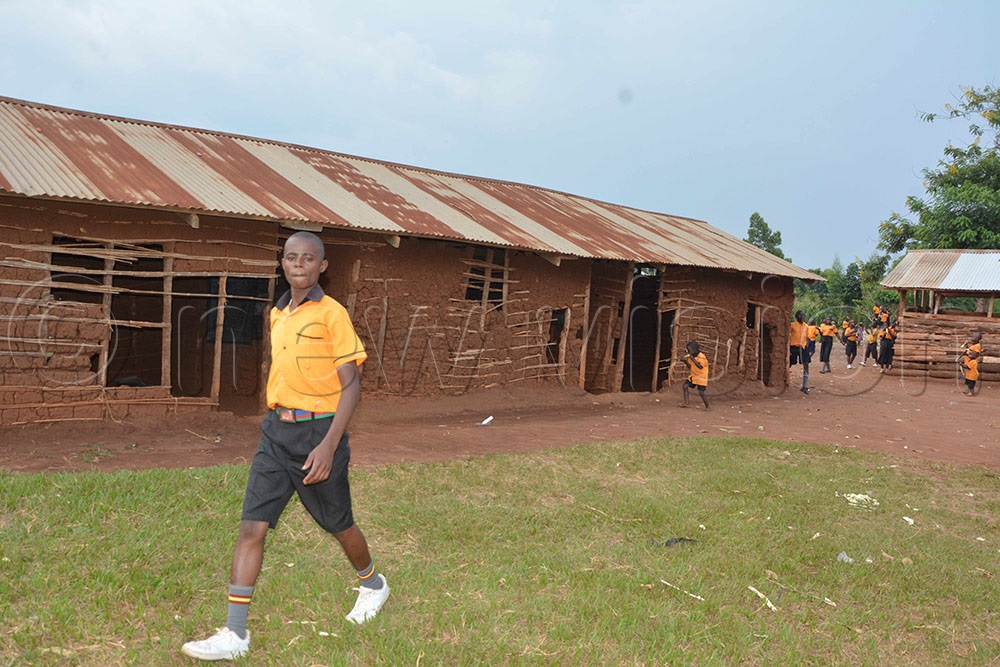
Limited access to essential services, such as bad school infrastructure (11%)......
Voter's voices
Michael Komakech, resident of Palaro sub-county in Gulu district
Most health centres lack essential drugs, forcing patients to buy medicine from private clinics. If people are going to elect leaders, they must vote for those with a strong focus on improving the health sector so that drugs and services are readily available in our health centres.
Acholi sub-region has also been left behind in education because many parents are poor. Voters should choose leaders who can strengthen the education system.
Justine Nakajumbi, Kyanamukaka sub-county, Masaka
Village health teams should be empowered for better healthcare.
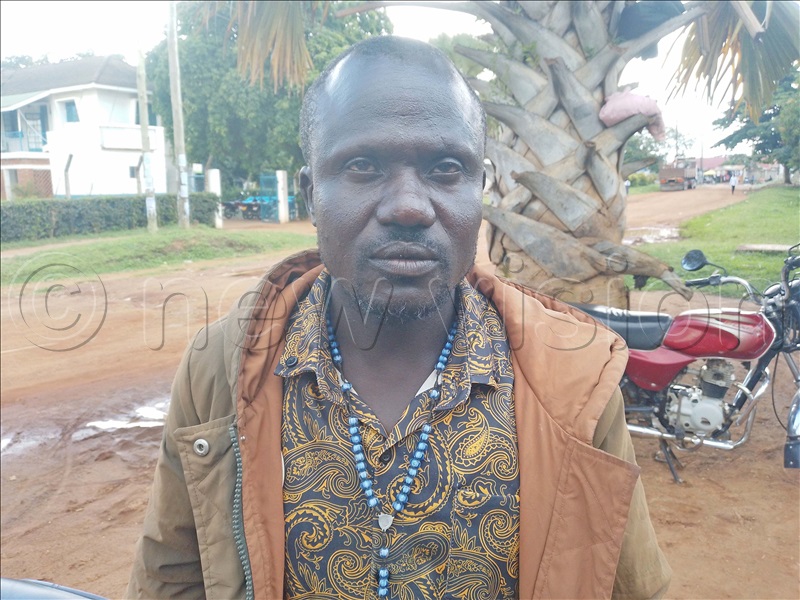
Julius Emolu
Julius Emolu, Aukot sub-county, Soroti
Lower health centres need working equipment and available medicines. The new schools need more teachers.
Rogers Bulegeya, Masaka city NRM party chairperson
The Government should address corruption that has paralysed service delivery in health centres.
Jesca Kyampeire, Nshozi village, Bushenyi municipality
Government should address the school fees issue. There is a need for regulation.
John Rwatooro, Katooke town council
We would be very far but the taxes are too much. However, other people are succeeding in farming. I am also turning to farming. Agriculture is helping people to flourish.
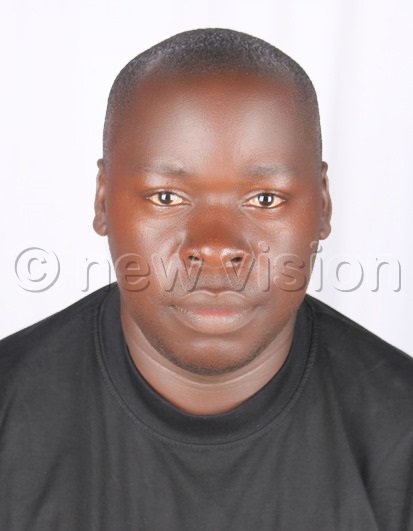
Roney Businge
Roney Businge, Kigoryabya town council
The education system we have has misled many. There is no school that gives sufficient knowledge about money and investment. We need this to be taught in schools.
What experts say
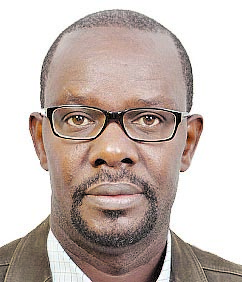
Dr Frederick Golooba-Mutebi
Dr Frederick Golooba-Mutebi, political analyst
The Government ought to invest more and curb corruption.
Peter Walubiri, a senior constitutional lawyer
The Government has to generate the right policies to grow the economy, increase public revenue, invest adequately in social services and public infrastructure and build viable public institutions.
Patrick Kaboyo, teacher and executive director of the education advocacy network
The views of the people in the Citizens’ Manifesto are a reflection on what is on the ground. For the country’s education sector to improve, the Government must invest in its teachers as soon as possible.

Dr Kedrace Turyagyenda
Dr Kedrace Turyagyenda, the education ministry permanent secretary
The Government is increasingly making progress to provide quality education and sports for all.
Fred David Egesa , security
The Government’s top-down approach to security has alienated the local population. Citizens have a wealth of information, yet their voices are rarely considered.
Dr Herbert Luswata, president of the Uganda Medical Association
Until Uganda meets its Abuja Declaration commitment of allocating 15% of the national budget to health, chronic drug and health personnel shortages will persist.
Dr Samuel Odong Oledo, former President of the Uganda Medical Association
There must be an organised system to avoid corruption in medical facilities. We must also establish a national health insurance scheme.
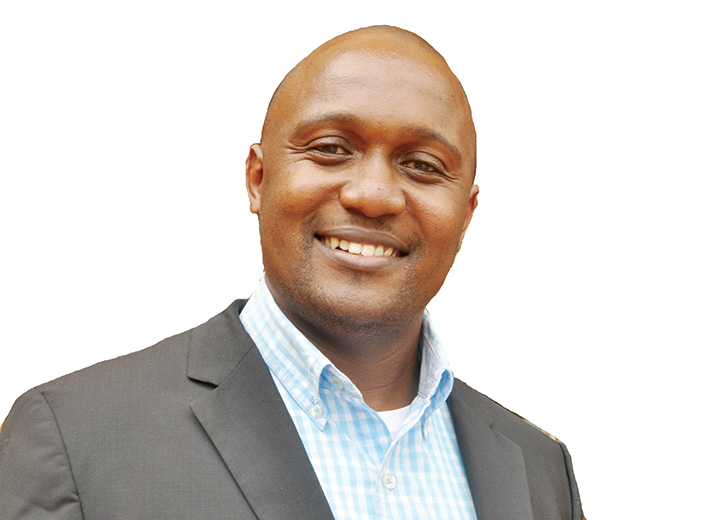
Dr Ekwaro Obuku
Dr Ekwaro Obuku, former President of the Uganda Medical Association
It is important that Vision Group has provided evidence-based guidance to leaders. Health service delivery requires more doctors, medical supplies and making all health centres IV functional

Methodology
The poll was conducted by Vision Group’s research team between March and May 2025, covering a sample size of 6,006 Ugandans countrywide.
They were each asked the question: “In your opinion, which issues are affecting this community?”
To ensure national representation, the Vision Group research team sampled eligible Ugandan voters from across 58 districts. Only citizens possessing a valid national identification card and aged 18 years and above were sampled.
The survey covered all 17 sub-regions of Uganda. The respondents were randomly sampled from both rural and urban areas.
Of the total respondents, 2,433 were from urban areas, while 3,573 respondents were picked from rural areas.
The majority of the respondents were between the ages of 25 and 29 (1,201) and 30 and 34 (1,058). Only 19 of the total sampled respondents refused to respond to the questions.
Vision Group’s editor-in-chief, Barbara Kaija, said the Citizens’ Manifesto is a compilation of Ugandans’ views collected by a team of professional researchers ahead of the national election.
Credibility of survey
The Vision Group research department has long experience in carrying out market research and opinion polling. An opinion poll, often referred to as a survey or a poll, is a human research survey of public opinion from a particular sample.
Previous survey
The latest Vision Group survey findings are consistent with those of previous studies.
For example, the last opinion poll conducted in March 2020, ahead of the 2021 general election, showed that the majority (14.3%) of respondents considered health the most pressing issue, followed by poverty (10.1%).
Other top issues were education, road network and transport, national security, water and sanitation, food security, energy, land, as well as employment. In that survey, 5,987 Ugandans were sampled across 45 districts.
Additional reporting by Godfrey Ojore, Adam Gule, Chris Mugasa, Wilson Assimwe, John Musenze, Harriet Kugona, Ibrahim Ruhweza and Johnisani Ocakacon
